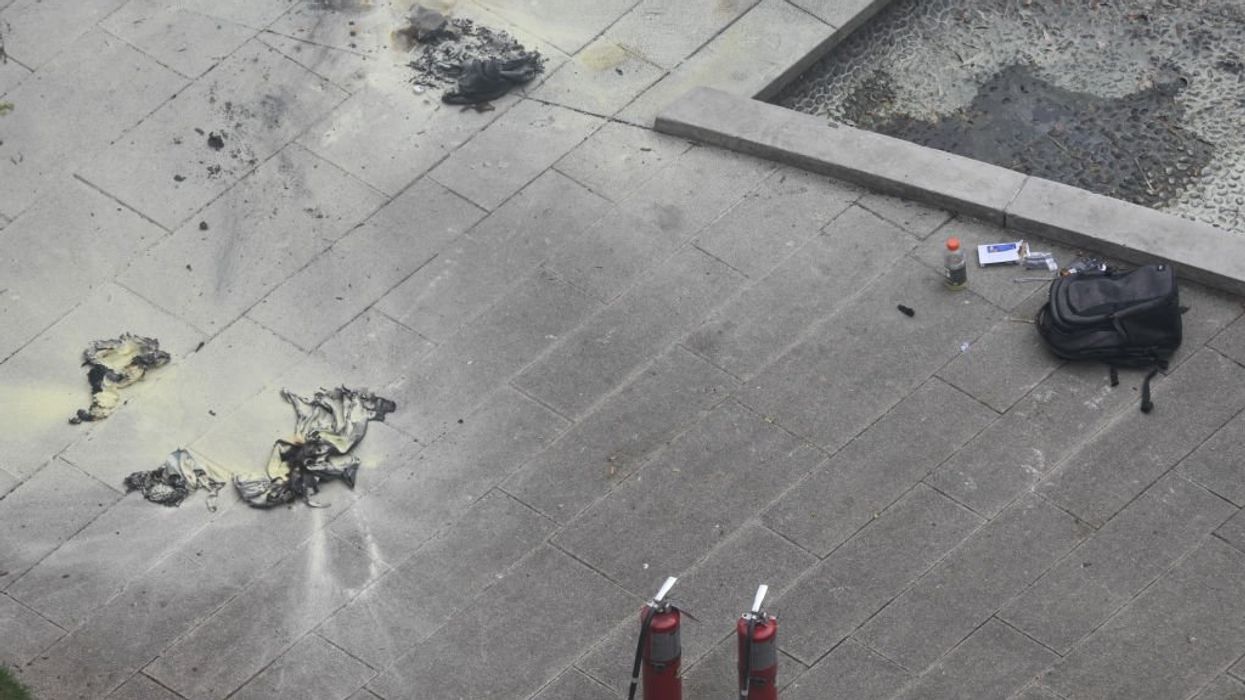Hundreds of thousands of fish — totaling more than 50 tons — were removed from a lake in Mexico this weekend — and scientists aren't entirely sure what caused the fish to die.
According to the Independent, multiple theories have been offered by experts, with the most accepted theory placing blame on pollution levels in Lake Cajititlan's water.
 Fishermen collect dead 'popocha' fish at the lagoon of Cajititlan in Tlajomulco de Zuniga, Jalisco State, Mexico, on September 1, 2014. (Hector Guerrero/AFP/Getty Images)
Fishermen collect dead 'popocha' fish at the lagoon of Cajititlan in Tlajomulco de Zuniga, Jalisco State, Mexico, on September 1, 2014. (Hector Guerrero/AFP/Getty Images)
A nearby tequila distillery is being blamed by locals, the Independent reported, for discharging poisonous waste into the lake. Others point to recent rain which could have sent fertilizers streaming into the body of water.
 A fisherman collects dead 'popocha' fish at the lagoon of Cajititlan in Tlajomulco de Zuniga, Jalisco State, Mexico, on September 1, 2014. (Hector Guerrero/AFP/Getty Images)
A fisherman collects dead 'popocha' fish at the lagoon of Cajititlan in Tlajomulco de Zuniga, Jalisco State, Mexico, on September 1, 2014. (Hector Guerrero/AFP/Getty Images)
However, not all experts are satisfied with the pollution explanation.
Director of the University of Guadalajara’s Fresh Water Institute Manuel Guzman Arroyo said the shallowness of the water may have starved the fish of the necessary amounts of oxygen needed to survive.
Mexico's Jalisco state's secretary for the environment Maria Magdalena Ruiz Mejia insisted that the deaths were "categorically" not a "natural and cyclical phenomenon."
 Dead 'popocha' fish are seen at the Cajititlan lagoon in Tlajomulco de Zuniga, Jalisco State, Mexico, on September 1, 2014. (Hector Guerrero/AFP/Getty Images)
Dead 'popocha' fish are seen at the Cajititlan lagoon in Tlajomulco de Zuniga, Jalisco State, Mexico, on September 1, 2014. (Hector Guerrero/AFP/Getty Images)
"We have no evidence to support that it is natural and cyclical, to the contrary, we have a series of variables which lead us to believe this phenomenon is not only recurrent and becoming more frequent and severe, and caused by the poor management of the body of water," she said.
Mejia was unable to produce any evidence supporting her statement, nonetheless, saying authorities were denied access to local wastewater treatment plants and, thus, could not carry out an investigation, according to the BBC.
—
Follow Oliver Darcy (@oliverdarcy) on Twitter

 Fishermen collect dead 'popocha' fish at the lagoon of Cajititlan in Tlajomulco de Zuniga, Jalisco State, Mexico, on September 1, 2014. (Hector Guerrero/AFP/Getty Images)
Fishermen collect dead 'popocha' fish at the lagoon of Cajititlan in Tlajomulco de Zuniga, Jalisco State, Mexico, on September 1, 2014. (Hector Guerrero/AFP/Getty Images)
 A fisherman collects dead 'popocha' fish at the lagoon of Cajititlan in Tlajomulco de Zuniga, Jalisco State, Mexico, on September 1, 2014. (Hector Guerrero/AFP/Getty Images)
A fisherman collects dead 'popocha' fish at the lagoon of Cajititlan in Tlajomulco de Zuniga, Jalisco State, Mexico, on September 1, 2014. (Hector Guerrero/AFP/Getty Images)
 Dead 'popocha' fish are seen at the Cajititlan lagoon in Tlajomulco de Zuniga, Jalisco State, Mexico, on September 1, 2014. (Hector Guerrero/AFP/Getty Images)
Dead 'popocha' fish are seen at the Cajititlan lagoon in Tlajomulco de Zuniga, Jalisco State, Mexico, on September 1, 2014. (Hector Guerrero/AFP/Getty Images)


